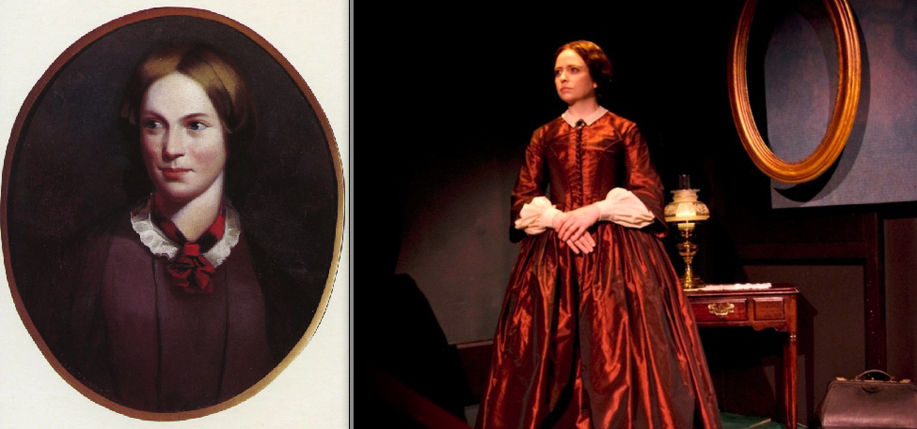“I wanted to claim Charlotte Brontë as one of our own because she is,” said Irish actress Maxine Linehan, who portrays Brontë, the author of Jane Eyre, in the one-woman show Brontë: A Portrait of Charlotte by William Luce.
“Charlotte’s schoolmates have remarked that she spoke with an Irish accent,” says Linehan. “Her father, Patrick, was born in County Down at Emdale, Drumballyroney, near Rathfriland, about 20 miles from my own home place in Newry. The more research I did, the more I saw the profound influence their Irish heritage had on Charlotte and her sisters.”
Patrick, whose family name was originally Brunty, an Anglicized version of O’Pronntaigh – a family of hereditary scribes (appropriate, that) – was the oldest of 10 children. His father, Hugh, a farm laborer had eloped with his mother, Alice McClory, when her family objected to the marriage, perhaps because Hugh was an outsider, born in southern Ireland and adopted by an uncle – a tale that resonates with his granddaughter Emily Brontë’s Wuthering Heights. Whatever the facts, there’s romance enough in Patrick’s well-documented rise through self-education from blacksmith’s apprentice to young schoolmaster and then, amazingly, to St. John’s College, Cambridge and ordination as an Anglican clergyman.
This history is made palpable in the Brontë Homeland, an open-air museum in County Down that contains Alice McClory’s family cottage, the school where Patrick Brontë taught and the church where he preached. Juliet Barker’s recent book, The Brontës, discussed the family’s roots in Ireland and highlighted the involvement of Patrick and his brothers in the rebellion of 1798. Barker argues that Charlotte Brontë was not a victim of circumstances, but a vibrant and talented artist. This is the woman Maxine Lenihan plays. As Backstage put it, “Charlotte Brontë requires a more robust portrayer and she gets one in Maxine Linehan.
“Charlotte had passion and intensity and a determination to do something out of the limit that society imposed on women in those days,” says Lenihan. In other words, she was a true Irish woman, as is Maxine Linehan.
“My mother is a McAnulty, one of thirteen, and my father, Patrick Linehan, has eight brothers and sisters. They met in London and came home to Newry where I was born and lived until I was eight, when we moved to Cork. We always returned to Newry for visits, so I knew the countryside around the Brontë homeland well. I got involved in acting and dancing at a young age and continued through wonderful years at the Presentation Convent in Crosshaven. Because I did well academically my parents and teachers encouraged me to pursue a degree from the University of London. I then went on to study at the Inns of Court, where I became a barrister and began working in London. But I had never forgotten the thrill of my first professional appearance in the theater. At seventeen I played Louisa in a production of The Sound of Music at the Cork Opera House. I got the bug. It never left me. When the London media company I was working for as in-house counsel moved to New York, I thought, this is it. I have to pursue acting. It’s who I am.”
Maxine won roles in musical theater productions and in dramas. Drawing on her own Northern Ireland roots, she appeared in the acclaimed New York premiere of Jacqueline McCarrick’s The Mushroom Pickers.
I experienced Charlotte Brontë in a completely new way while watching this production. Maxine Linehan reaches out to the audience and brings us into Charlotte’s emotional life. We feel her strength when she refuses to be defeated by the tragic death of her siblings or her unrequited love for the married headmaster of the Brussels school where she taught. Show Business magazine said that “Linehan’s portrayal of Charlotte is one of a heartbroken but plucky and at times humorous heroine.” But I was most affected by the scene in which Maxine as Charlotte puts on masks and in turn becomes each of her lost sisters and brother. She evokes this motherless family, an island unto themselves, who create their own independent nation using songs and stories, supported by family love. They are not deterred by hardship or the indifference of the outside world. Doesn’t that sound like the Irish experience itself?
The Brontë sisters gave the world masterpieces far beyond what seemed possible. Jane Eyre still sells in the hundreds of thousands every year, and has inspired classic movies and plays. Charlotte Brontë died too young but achieved immortality, as did so many Irish heroes. Charlotte Abú. Bravo Maxine Linehan. Don’t miss it.
Brontë: A Portrait of Charlotte has an open run at The Actor’s Temple, 399 West 47th Street, New York.


I’m afraid she’s not one’s of yours. Sure, they had irish blood, which many English people have, but they were English. Sorry, but that’s the cold stone fact. It’s like saying that Edgar Allen Poe was half English. Which he wasn’t, he was American. There’s much more than nationality than blood and the Bronte sisters weren’t Irish, they were English. She wasn’t a true Irishwoman because she wasn’t raised In Ireland and never did she live there.
That’s a ridiculous thing to say. Of course the children were half Irish and half English. And they did spend extended periods in Ireland by the way – but this neither adds or detracts from the fact that their father was Irish. My husband is Dutch – our children although raised in Ireland – hold Dutch and Irish passports. They are half Irish – half Dutch. Even if they never set foot in the Netherlands, they will always be half-Dutch.